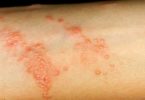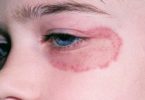What's in this article?
Some strains of strep throat can lead to a scarlet fever-like rash. The rash first appears on the neck and chest. Then it spreads over the body. Scarlet fever is caused by an infection with group A streptococcus bacteria.
Common symptoms of strep throat in children and adults include:
- Severe and sudden sore throat without coughing, sneezing, or other cold symptoms.
- Pain or difficulty with swallowing.
- Fever over 101°F (38.3°C). Lower fevers may point to a viral infection and not strep.
- Swollen lymph nodes in the neck.
- White or yellow spots or coating on the throat and tonsils.
- Bright red throat or dark red spots on the roof of the mouth at the back near the throat.
- Swollen tonsils, although this symptom may also be caused by a viral infection.
Is strep throat contagious?
Yes, strep throat is contagious. The most common way to catch strep throat is by contact with an infected person.
Close contact with airborne droplets of an infected individual is the most common way of catching Streptococcus infection. Close quarters such as college dormitories, day care centers, military facilities, schools, and the family home provide ideal conditions for transmission of strep throat from one person to another. The risk of acquiring strep throat from an affected family member nears 40%. Spread through food-borne outbreaks is less common, but possible.
The risk of being contagious with strep throat diminishes substantially after initiation of proper antibiotic treatment.
Causes of Strep Throat
Strep throat is most common in children between ages 5 and 15, although anyone can get it.
Strep throat is spread by person-to-person contact with fluids from the nose or saliva. It commonly spreads among family or household members.
Treatment of Strep Throat
Most sore throats are caused by viruses, not bacteria.
Sore throats should only be treated with antibiotics if the strep test is positive. Antibiotics are taken to prevent rare but more serious health problems, such as rheumatic fever.
Penicillin or amoxicillin is usually first tried. Antibiotics should be taken for 10 days, even though symptoms are usually gone after a few days.
The following tips may help your sore throat feel better:
- Drink warm liquids such as lemon tea or tea with honey.
- Gargle several times a day with warm salt water (1/2 tsp of salt in 1 cup water).
- Drink cold liquids or suck on popsicles.
- Suck on hard candies or throat lozenges.
- Young children should not be given these products because they can choke on them.
- A cool-mist vaporizer or humidifier can moisten and soothe a dry and painful throat.
- Try over-the-counter pain medications, such as acetaminophen.











